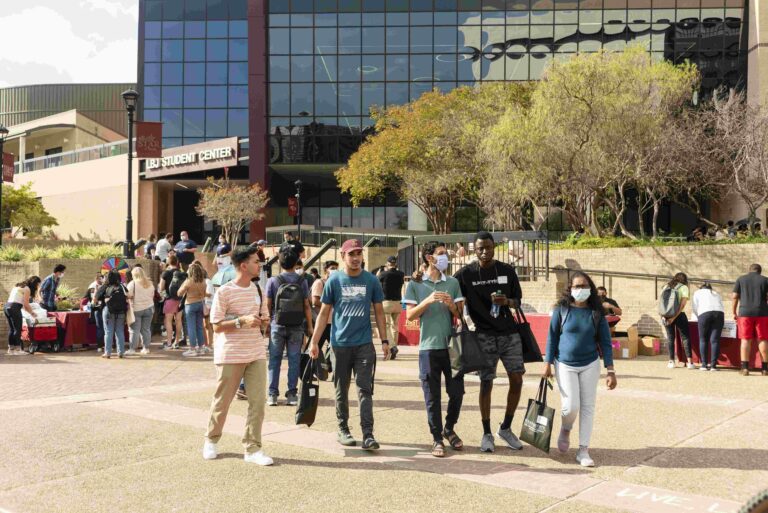How Immigration Enforcement Shapes the Academic Lives of International Students in Texas
Transformations in Academic Engagement Amid Heightened Immigration Controls
Recent escalations in immigration enforcement across Texas have significantly altered the educational environment for international students. Many of these students grapple with increased apprehension about their visa status and potential deportation, which leads them to self-impose restrictions on their speech and participation both inside and outside the classroom. This atmosphere of caution curtails their ability to engage openly in academic debates, select research topics freely, and partake in campus life, ultimately diminishing their educational and professional development opportunities.
Key challenges identified by universities and student advocates include:
- Hesitancy in participation: Avoidance of politically or socially sensitive discussions to minimize risk.
- Networking limitations: Reduced involvement in student organizations and events due to fear of exposure.
- Emotional strain: Increased feelings of isolation and anxiety impacting mental health.
| Dimension | Effect on International Students |
|---|---|
| Academic Expression | Reluctance to engage in open research and classroom discussions |
| Campus Involvement | Withdrawal from extracurricular and social activities |
| Mental Health | Elevated stress and social isolation |
Adaptive Measures Employed by Students to Maintain Academic Progress
In response to intensified immigration scrutiny, international students in Texas have adopted various discreet tactics to protect their educational pursuits. Many consciously moderate their online presence, steering clear of politically charged content or personal opinions that might draw attention. Within academic settings, students often avoid controversial topics, prioritizing their studies over open debate.
Additional practical strategies include:
- Creating confidential peer networks: Sharing information within trusted circles.
- Using encrypted communication tools: Ensuring privacy in academic collaborations.
- Consulting university advisors: Seeking guidance on immigration-related uncertainties.
- Minimizing participation in public demonstrations: Avoiding events that could be documented by authorities.
| Approach | Objective | Outcome |
|---|---|---|
| Restricting social media activity | Evade surveillance | Lowered digital footprint |
| Encrypted messaging groups | Secure academic discussions | Enhanced peer collaboration |
| Trusted peer circles | Safe information exchange | Increased community support |
| Advisor consultations | Legal and emotional support | Informed decision-making |
University Initiatives to Support International Students Under Pressure
Recognizing the unique challenges faced by international students amid stricter immigration enforcement, Texas universities have implemented targeted support systems. These include confidential mental health counseling and legal assistance programs designed to help students navigate complex immigration regulations while focusing on their studies. Faculty training programs aim to equip educators with the skills to identify distress and offer culturally competent support, fostering a more inclusive campus atmosphere.
Many institutions have also established dedicated resource centers that provide:
- Educational workshops: Informing students about their rights and safety in a changing legal landscape.
- Language assistance: Programs to overcome communication barriers and enhance academic success.
- Peer mentorship: Initiatives to build resilience and community among international students.
Maintaining a diverse international student body is crucial not only for enriching academic discourse but also for supporting local economies and cultural exchange. Collaborative efforts between universities, legal experts, and government agencies are underway to establish frameworks that protect students’ educational paths without compromising their safety.
| Institution | Program | Highlight |
|---|---|---|
| University of Texas at Austin | Legal Support for International Students | Monthly free legal workshops |
| Texas A&M University | Cultural Resilience Network | Peer-led support groups |
| Rice University | Language and Advocacy Center | Bilingual counseling services |
Policy Proposals to Harmonize Immigration Enforcement with Educational Access
To protect international students’ right to education without fear of immigration repercussions, policymakers should enact clear protections that separate immigration enforcement from academic settings. Designating universities as sensitive locations where immigration actions are limited would create safer spaces for students to engage fully in campus life and intellectual exchange.
Furthermore, collaboration between educational institutions and lawmakers is essential to provide:
- Accessible legal aid: Free counseling and legal services tailored to international students.
- Confidentiality safeguards: Strict privacy protocols regarding students’ immigration status.
- Legislative guarantees: Ensuring education access regardless of immigration status to prevent self-censorship and promote equity.
| Policy Focus | Recommended Action |
|---|---|
| Campus Safety | Establish universities as protected zones exempt from immigration enforcement |
| Legal Support | Allocate funding for free legal and counseling services |
| Privacy | Implement strict confidentiality rules for student immigration information |
| Educational Rights | Guarantee access to education irrespective of immigration status |
Looking Ahead: Upholding Educational Equity Amid Immigration Challenges
As immigration enforcement continues to intensify in Texas, international students face the difficult task of balancing their academic ambitions with concerns for personal safety. The growing prevalence of self-censorship underscores the far-reaching effects of immigration policies, extending beyond legal and economic spheres into the everyday academic and social experiences of these students. Amplifying the voices of international students will be vital in shaping future immigration reforms and ensuring equitable access to education both in Texas and across the United States.







